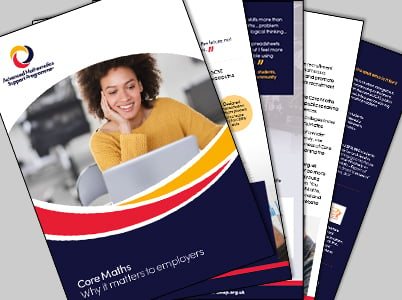Core Maths
Why Core Maths is a valuable qualification
Core Maths is a really valuable qualification for your prospective employees. It was designed in partnership with employers, and its objective is to enhance the employability of school leavers and apprentices by developing their quantitative and problem-solving skills.
It’s a specific type of maths qualification for students who’ve passed GCSE Mathematics at grade 4 or better, but who have decided not to go on to study AS or A level Mathematics.
The Core Maths course is around half the size of an A level course, and it can be studied alongside A levels or vocational courses.
Growing in popularity
Since the first Core Maths exams took place in 2016, today its popularity among students is growing rapidly: over 12,100 students completed it in 2021.
This means there will be increasing numbers of young people who’ve now studied Core Maths that are applying for jobs – and backed by a great qualification to make them far more workplace-ready when dealing with, for examples, statistics, graphs and other data.
If you think Core Maths will be useful preparation for a career in your business, we would encourage you to refer to it in your job advertisements, even if it’s just desirable, rather than essential. If young people see that you value the knowledge and skills Core Maths develops, they will be encouraged to choose to study it.

Core Maths – and why it matters to employers
Find out more about the real value of this subject and how you can promote it in this leaflet from the Advanced Mathematics Support Programme.
Read leafletWhat’s studied in Core Maths?
All Core Maths qualifications include:
- interpreting solutions in the context of the problem
- understanding sources of error and bias when problem-solving
- working with data
- understanding risk and probability
- understanding variation in statistics
- using exponential functions to model growth and decay
Most Core Maths qualifications also include:
- percentage change
- interpretation of graphs
- financial maths
- using standard units
- Fermi estimation
- the Normal distribution
- correlation, knowing it does not imply causation
- making and evaluating assumptions when modelling or problem solving
And, there are six different Core Maths qualifications:
- AQA Level 3 Certificate Mathematical Studies
- City & Guilds Level 3 Certificate in Using and Applying Mathematics
- NCFE Level 3 Certificate in Mathematics for Everyday Life
- Pearson Edexcel Level 3 Certificate in Mathematics in Context
- OCR Level 3 Certificate in Core Maths A (MEI)
- OCR Level 3 Certificate in Core Maths B (MEI)
They are all graded A-E.
A more in-depth look at the Core Maths qualifications is provided within the section of our website for teachers.
Take a look
